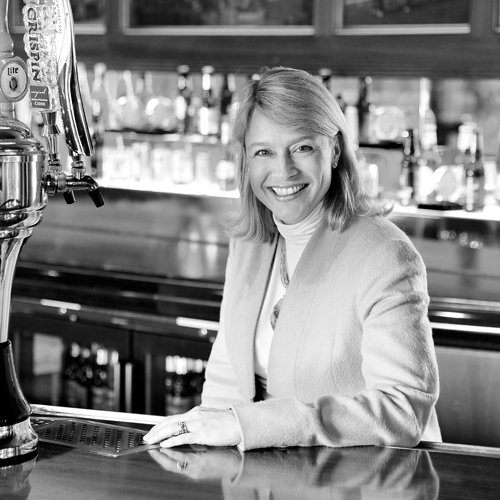Beer is the universal beverage of friendship. In bars, pubs, and saloons around the world, the clanking of steins is the sound of people coming together. It should come as no surprise, then, that four of America’s founding fathers were avid beer drinkers and brewers. In fact, it was over beers at their local tavern that they decided to start the American Revolution.
More than two centuries later, beer continues to break down barriers. In 2009, President Barack Obama diffused a national debate about racism by having a beer with black Harvard professor Henry Louis Gates, Jr. and the white police officer who had arrested him weeks earlier for disorderly conduct. “I have always believed that what brings us together is stronger than what pulls us apart,” President Obama said after the so-called “beer summit.”
Beer is more than a beverage. It’s also a powerful unifier. A brewing company, therefore, is the perfect place for Sabine Chalmers, the chief legal and corporate affairs officer who orchestrated the massive merger that formed Anheuser-Busch InBev (AB InBev). Like most corporate attorneys, her head buzzes with talk of contracts and compliance, but at the end of the day, it’s not documents and deals that fuel her career—it’s her passion for bringing diverse people together.
“One real beauty of having a diverse team, particularly in the modern world, is that you are mirroring your customer base.”
Chalmers became an American citizen in January 2014. In spite of what her passport says, it’s obvious to anyone who knows her that she doesn’t belong to any single nation. Rather, she belongs to the world.
The source of Chalmers’ transnationalism is her upbringing. Born to a German father and an Indian mother, she grew up in India and the Philippines, both of which have long and complicated social histories. “My parents married very young in India,” Chalmers says. “It’s more common now, but back then it was really something for people of mixed cultures, mixed colors, mixed religions, and mixed backgrounds to marry. And on top of that, to marry for love. Fortunately, I had an amazing Indian grandmother who was very forward-thinking and allowed each of her four children to make their own choices in life—which was a pretty big deal in India at that time.”
Her grandmother’s tolerance left a major impression on Chalmers. So did her father, a self-made man who traveled Asia on behalf of his employer, a German textiles manufacturer. “I got my natural curiosity for the world and different cultures from my dad,” says Chalmers, whose father lacked experience, higher education, and money when he left Germany for Asia at age 17. “Both he and my grandmother were huge role models for me. Many of the values I have today I took away from them.”
Those values—not the least of which is an appreciation for different nationalities, religions, and cultures—are what ultimately persuaded Chalmers to pursue a legal career. “When I was growing up, I was very sensitive to inequality and hardship because examples were all around me,” says Chalmers, who also considered careers in journalism and diplomacy. “I had an attraction to law because I saw how you could use language and the rule of law to find solutions and help people do the right thing.”
Chalmers attended university in London, but she envisioned herself in the United States. “I’ve always felt that America had the sort of value system that was important to me in terms of tolerance, diversity, and inclusion,” she says.
70
Nationalities represented in the AB InBev workforce
100
Countries where AB InBev sells its many beer brands
25
Countries in which AB InBev operates
200
Beer brands brewed and sold around the world by AB InBev
150k
Global employees
How she finally made it to the US is a classic case of serendipity. After studying law at the London School of Economics, Chalmers spent six years at a London law firm where she specialized in commercial law, including mergers and acquisitions. Although she liked it, she was hungry for an in-house role where she could have an influence not only on transactions, but also on teams. That’s when the phone rang.
“A wonderful professor who taught me at law school called,” Chalmers says. “She worked at what was then called Guinness PLC—the company that makes Guinness stout and Johnnie Walker whisky—and they were looking for a junior in-house lawyer.”
Chalmers joined Guinness, now Diageo, in 1993 and stayed for 12 years. She started in London but eventually ended up in the United States, where she became general counsel of the company’s US business. “From the first moment, this has been a country I’ve felt very, very comfortable in,” Chalmers says. “Everyone here is from everywhere with a passion to make a positive difference for their families and for those around them. I’ve felt at home from the get-go.”
Chalmers briefly left the US in 2005, when she accepted a position as general counsel for Belgium-based InBev, a brewing company formed by the 2004 merger between Belgium-based Interbrew and Brazil-based AmBev. She’s back stateside after merging with Anheuser-Busch, and she’s leading a veritable United Nations of beer from the company’s New York office.
It’s hard to imagine a better fit for Chalmers than AB InBev, whose brands include Budweiser, Corona, Stella Artois, Beck’s, Hoegaarden, Busch, and Rolling Rock, just to name a few. First of all, there’s her German heritage, which means there’s equal parts blood and beer in her veins. Second of all, there’s the company’s DNA, which is an amalgamation of several different corporate and geographical cultures. Along with Interbrew and AmBev—from Europe and South America, respectively—AB InBev acquired US-based Anheuser-Busch in 2008, Mexican brewer Grupo Modelo in 2013, and South Korean brewer Oriental Brewery, which was repurchased in 2014 after selling the company in 2009.
“My interest in different countries and different cultures is incredibly well represented here,” explains Chalmers, who says AB InBev has divided its global operations into six geographical zones, each of which has a legal group that reports to her. “Just within the legal and corporate affairs departments we have 30-plus nationalities.” The collision of so many cultures could easily cause conflict or confusion, but it actually fuels growth and innovation in AB InBev’s legal department.
The secret, according to Chalmers, is in how her department hires. First and foremost, her team recruits attorneys who fit the corporate culture—regardless of their national, ethnic, or religious culture. “To be happy and effective within the company as a lawyer you must understand and share the values of the organization,” she says. “That’s how you become embraced as a business partner so that you can do your job, which is helping the business find solutions.”
Instead of legal skills alone—which are assumed as a given—job applicants are therefore screened for soft skills like communication and teamwork. When colleagues of different nationalities share those qualities, Chalmers says, their differences fade away.
To further hone these skills and develop attorney’s careers, the legal department has a foreign exchange program whereby attorneys from AB InBev’s various regions can spend several months supporting the business team in another geography, and the benefits of this program have been manifold. “As an example, one of our most important businesses is in China,” Chalmers says. “We have an amazing head of legal and corporate affairs there who has grown a sizable team of amazing Chinese lawyers. We’ve given a number of [them] the opportunity to spend time working out of our offices in Belgium, New York, or St. Louis. A couple things happened by doing so. First, it’s fantastic for building the engagement and skills of folks who are from China. They’re perfecting the English language and learning a completely different culture, which makes them much better lawyers and professionals when they go back. Second, the folks here learned exponentially from them as well because they can take an idea and see it from a completely different perspective. It’s amazing. When you move people out of their comfort zone, it’s great not only for them, but also for their colleagues in the place they’re moving to, who really benefit from understanding and seeing a different way of doing things.”
The diversity benefits not only AB InBev’s employees, but also its customers, who themselves are incredibly diverse across the globe. “One real beauty of having a diverse team, particularly in the modern world, is that you are mirroring your customer base,” Chalmers says. “Everybody who’s out there who enjoys beer is really different and diverse—of all ages, nationalities, backgrounds, and cultures. The more you have a team that reflects that, the better your understanding of who it is that ultimately you’re trying to serve.”


